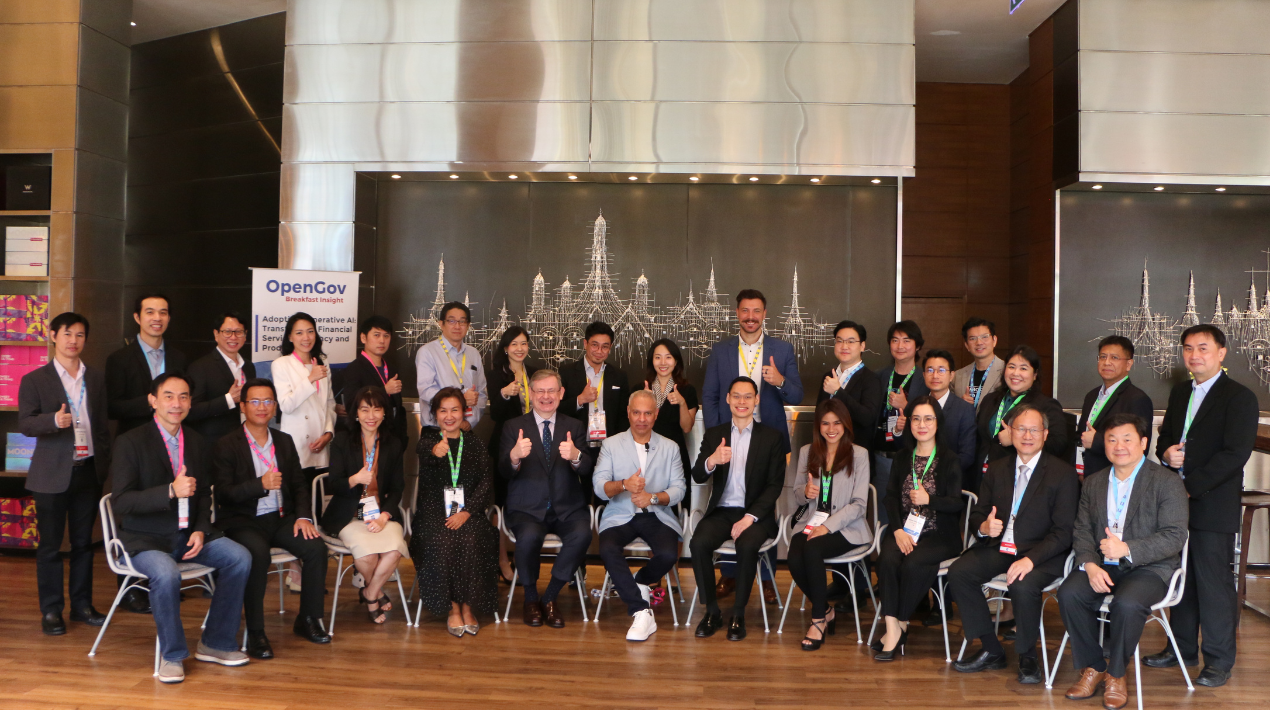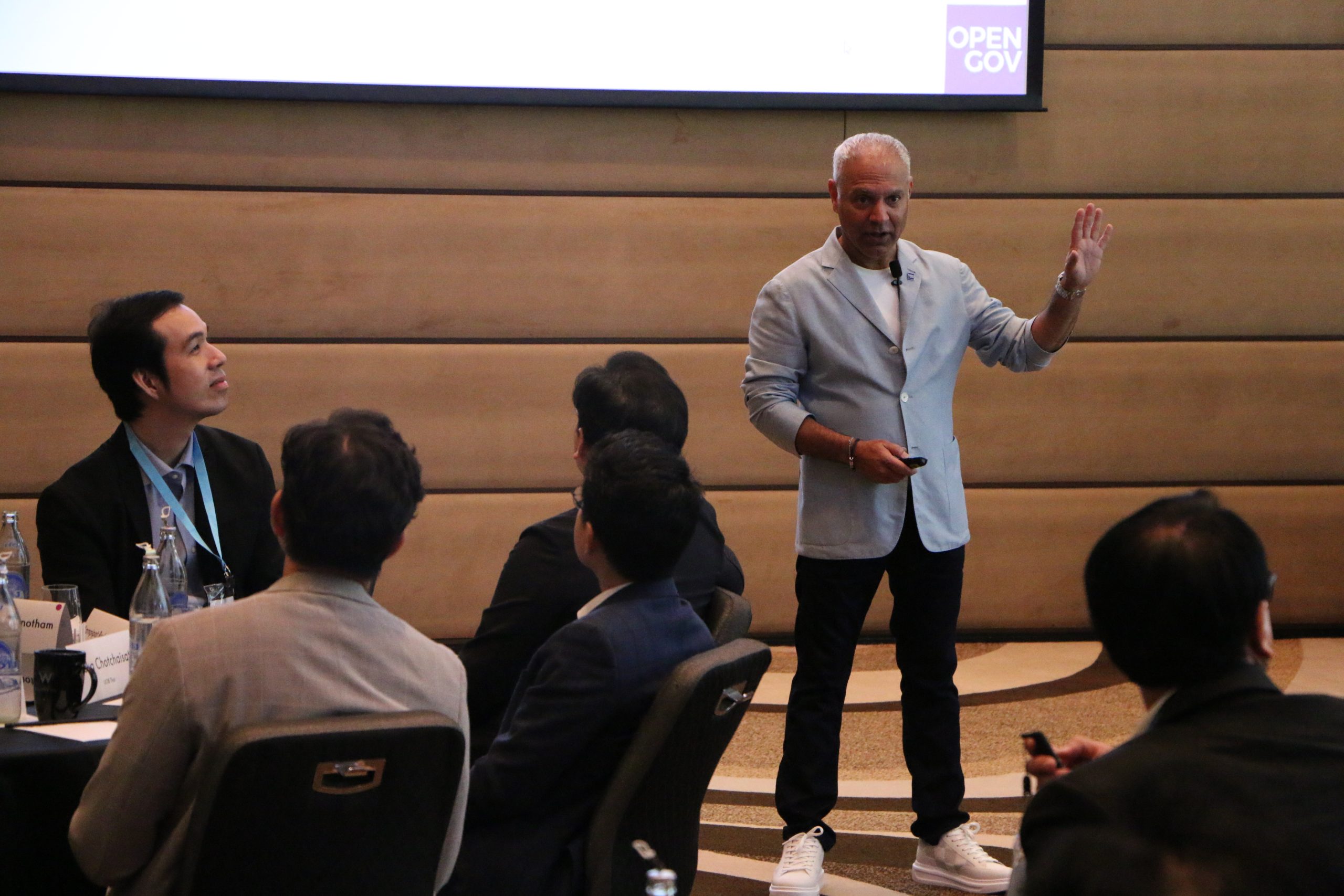
|
Getting your Trinity Audio player ready...
|
The Thai government is actively engaged in formulating Thailand’s National Artificial Intelligence (AI) Strategy Plan, with a vision to fortify the nation’s economy and enhance the well-being of its people by 2027. Through dedicated endeavours and strategic measures, Thailand aspires to unlock the full potential of AI as a catalytic agent, fostering advancement and prosperity across diverse sectors of the nation.
The Thai government’s commitment to realising this vision is reflected in its multifaceted approach. As a part of this comprehensive strategy, it is actively addressing several key areas. Notably, enhancing preparedness in dealing with the social, ethical, legal, and regulatory dimensions of AI stands as a pivotal component of their plans.
Data from IBM reveals that, despite the increasing adoption of AI, only about 35% of companies have fully integrated it into their operations, while another 42% of companies are still in the exploration stage of AI’s potential. This shows that there is still huge scope for companies to take full advantage of AI technology.
Besides, the financial services industry in particular has seen a significant increase in the use of Generative AI which focuses on its ability to generate new data or content based on patterns extracted from existing data. These innovations have opened up new opportunities and brought about profound changes in the way the financial services industry operates.
With Generative AI, the financial services industry has identified tremendous potential in various fields. This includes using technology to detect fraud, evaluate risk, create a more personalised experience for customers, and better analyse the market. The transformational impact delivered by Generative AI includes the ability to create highly personalised content and more efficient processes.
This innovation promises significant future growth, and increased productivity, and opens up limitless opportunities for the financial services industry. However, the financial services industry faces challenges, similar to other sectors, in taking Generative AI projects from pilot to successful production, with only some achieving the desired results.
To effectively adopt Generative AI, the financial services industry must have the ability to understand the decision-making process of AI models and communicate it effectively to regulators, customers and internal parties.
Transparent and interpretable AI systems play an important role in building trust because they allow users to understand how the AI reaches its decisions, so they can validate the results and have confidence in the reliability of the technology. These systems also facilitate regulatory compliance by providing auditable and accountable processes.
The OpenGov Breakfast Insight on 9 November 2023, at W Bangkok, Thailand, saw enthusiastic engagement from prominent figures in the technology and financial sectors. The session provided a platform for in-depth discussions surrounding the advantages and challenges associated with the adoption of Generative AI in the financial industry, with a focus on enhancing productivity and ensuring objective performance.
Opening Remarks

Mohit Sagar, CEO and Editor-in-Chief of OpenGov Asia acknowledges that Generative AI can act as a catalyst for enhancing productivity and performance within the financial sector, underlining its transformative potential.
Harnessing the capabilities of AI models empowers organisations to reach new heights of productivity in their service delivery. This transformation is particularly prominent in Thailand’s banking sector, where there is a rapid acceleration in the adoption of cutting-edge technology.
Numerous banks in Thailand are already actively delving into the realms of AI, cloud computing, Web3, blockchain, digital assets, and neocore technologies, observes Mohit. The potential of Generative AI, in particular, stands out as a transformative force within the Thai banking sector.
This move is not merely a trend; it’s a strategic move to stimulate growth, curtail operational costs, and enhance overall efficiency. As Thailand’s economy undergoes significant changes and digital transformation becomes a focal point, the banking industry is keen on staying at the forefront of these developments by integrating AI solutions to optimise operations and elevate customer service standards.
Generative AI holds the promise of revolutionising this industry by delivering highly personalised services to customers, fortifying security measures, boosting operational efficiency, and ensuring robust compliance with the prevailing regulatory standards. In essence, it’s a strategic push towards enhancing the overall banking experience and staying aligned with the cutting edge of technological progress.
Generative AI can assist in forming an organisational strategy framework. Through in-depth data analysis and predictive capabilities, AI systems can provide insight into decision-making. This helps organisations formulate policies, identify market opportunities, and plan strategic steps that can improve their performance and competitiveness.
The adoption of AI into the banking world will have a significant positive impact on accelerating bank performance. By leveraging AI, banks can optimise their processes, such as risk analysis, portfolio management, customer service, and fraud detection, which in turn will improve operational efficiency and provide a better experience to customers.
Another major benefit is the ability to detect fraud and manage cyber threat risks more effectively. With in-depth analysis capabilities, Generative AI can identify suspicious patterns, thereby helping organisations from cyber threats and potential losses.
“Therefore, Generative AI serves as more than just an analytical tool; it emerges as a robust strategic ally in shaping the organisation’s vision and objectives, as well as driving efficiencies and delivering a great, secure customer experience,” Mohit firmly asserts.
However, when embracing Generative AI, organisations should simultaneously undertake strategic measures to facilitate its effective integration. These strategies encompass the provisioning of sufficient dedicated infrastructure to bolster Generative AI operations, the enforcement of robust data security protocols and the formulation of ethical principles and values governing its utilisation. It must include adequate employee training, ongoing performance monitoring and routine evaluation of Generative AI deployment.
With careful planning and a good understanding of how Generative AI can provide added value to financial institutions, the opportunities for success will be increasingly wide open. If the use of Generative AI can be optimally optimised, financial institutions will be successful in improving customer service performance.
“Through a steadfast dedication to compliance and ethical standards, financial institutions can attain enduring success in their adoption of this cutting-edge technology,” Mohit concludes. “Nonetheless, it’s crucial to bear in mind that maximising the potential of Generative AI necessitates a focus on ethical considerations, data privacy, and a comprehensive grasp of the regulatory landscape within the financial sector.”
Welcome Address

Surarit Wuwong, Country Manager & Technology Leader Thailand, IBM acknowledges that Generative AI offers significant potential in increasing accuracy and efficiency. This technology is a useful tool in the world of finance, where every choice and transaction has a significant impact.
For instance, in the underwriting process, Generative AI’s capabilities can lead to a more thorough analysis of customer data, yielding more precise recommendations and ultimately lowering credit risk. Furthermore, in the realm of fraud detection, this technology proves invaluable in identifying complex patterns that often go unnoticed by traditional methods.
Surarit points out that the integration of Generative AI in Thailand’s financial sector underlines the industry’s dedication to ongoing innovation and the adoption of cutting-edge technology. With the advancement of this technology, there is optimism that the financial services sector will be better positioned to deliver enhanced, expeditious, and more efficient services to customers while continuing to be a driving force for economic growth in Thailand.
“The significance of Generative AI in financial services lies in its ability to generate synthetic data, automate processes and provide valuable insights for decision-making,” Surarit furthers. “By embracing Generative AI, financial institutions can unlock new opportunities, increase efficiency, reduce risk, and achieve better results in a dynamic and complex financial world.”
Generative AI offers numerous advantages and opportunities that hold the potential to transform various facets of financial operations. Firstly, it empowers the generation of synthetic data that closely mimics real-world financial data. This synthetic data serves as invaluable training material for machine learning (ML) models, thereby enhancing their capabilities in pattern recognition, trend detection, and precise prediction. Overcoming the constraints commonly associated with real-world data, such as data gaps or biases, Generative AI facilitates more robust and accurate analytical processes.
Additionally, Generative AI offers automation capabilities that can completely transform financial processes. It can automate tasks previously performed manually, such as data analysis and fraud detection. By automating these processes, financial institutions can increase operational efficiency, reduce human error, and significantly reduce costs.
IBM plays a pivotal role in introducing Generative AI solutions, signifying a significant breakthrough in the financial services sector. Their technology facilitates the generation of precise synthetic data, bolsters predictive analysis, and automates time-intensive tasks.
IBM has been working with financial institutions to integrate Generative AI into various aspects of their operations. The result is increased performance, accuracy and efficiency in data analysis, fraud detection and data-driven decision-making. This helps financial institutions to respond more quickly to market changes and provide better service to their customers.
In an era where data is a very valuable asset, IBM’s role in delivering Generative AI solutions has made a major contribution to the progress of the financial services industry in Thailand and around the world. “By continuing to utilise this technology, financial institutions can remain relevant and competitive in an ever-changing financial ecosystem,” Surarit concludes.
Technology Insight

John J Duigenan, Global Leader, Financial Services Industry, IBM Technology GM & IBM Distinguished Engineer, IBM, offered a comprehensive overview of the rapidly evolving global financial landscape. He underscored the vital influence of technology in moulding the sector’s upcoming trajectory and imparted valuable perspectives on the fundamental trends that delineate the global financial services industry.
According to John, the emergence of digital banking, commonly known as “fintech,” is a prominent driving force in the financial realm. The increasing influence of digital-first strategies, which are propelled by the convergence of mobile technology, cloud computing, and data analytics, is intrinsic to this evolution.
“This transformation is characterised by the seamless, convenient, and personalised banking experiences it offers,” John explains. “It challenges both incumbent financial institutions and new market entrants to meet the ever-evolving expectations of customers.”
Moreover, artificial intelligence (AI) and machine learning (ML) are now indispensable tools in the financial sector. These technologies are being harnessed across the value chain, from automating customer service through chatbots to detecting fraud and predicting market trends.
ML models, in particular, are enhancing risk management and trading strategies, offering the financial industry a substantial competitive edge. He outlined some of the key trends reshaping the global financial landscape.
The transformative potential of blockchain and distributed ledger technology (DLT) is seen in their capacity to revolutionise financial transactions. DLT creates a decentralised, tamper-proof record, streamlining processes, reducing fraud, and enhancing transparency. Its applications extend to cross-border payments, trade finance, digital assets, and central bank digital currencies, promising heightened security and efficiency.
The financial industry faces an increasingly intricate regulatory landscape, in which, John points out, RegTech is a viable solution. This “regulatory technology” employs automation, data analytics and AI to streamline regulatory compliance. It simplifies tasks like Know Your Customer (KYC) and Anti-Money Laundering (AML) checks, allowing compliance teams to focus on high-value activities.
John underscored the pivotal role of cybersecurity citing that advanced threat detection, behavioural analytics, and encryption are key technologies in safeguarding financial data. Data privacy and adherence to regulations like GDPR are central considerations, requiring unwavering protection of customer information.
In the current environment, remote work and digital collaboration are integral, leading to the reimagining of roles within the industry. Hence, automation of repetitive tasks enables employees to focus on strategic, customer-centric activities, reshaping talent strategies and skill requirements.
Customers and investors are actively seeking institutions that share their values. Sustainable finance incorporates ESG (Environmental, Social, and Governance) criteria into decision-making, with technology playing a vital role in the analysis and reporting of ESG data. This integration empowers stakeholders to make informed decisions that are in harmony with sustainable objectives.
Moreover, to foster innovation and address the changing demands of customers, fintech startups, traditional financial institutions and technology providers must collaborate. Building resilience through robust cybersecurity measures and thorough business continuity planning is equally essential in this partnership.
“Technological innovations are reshaping how financial services are delivered and consumed, presenting opportunities for growth and positive impact,” John concludes. “To thrive, institutions must embrace digital transformation, prioritise security and adapt to evolving customer and investor expectations, positioning the sector at the precipice of a new era.”
Closing Remarks
Surarit underscores the transformative influence of Generative AI, the advanced iteration of artificial intelligence, within the financial services sector. Generative AI stands at the vanguard of innovation, automating mundane tasks, analysing extensive datasets, offering predictive insights, and even generating content with a human-like level of creativity.
Its versatile applications span customer service, fraud detection, risk assessment, and portfolio management, fundamentally reshaping the operational landscape of financial institutions. Moreover, Generative AI not only streamlines operations but also elevates customer service, fostering stronger relationships within the financial sector.
The integration of Generative AI into financial institutions entails several pivotal steps. The journey begins with a strong emphasis on education and skills development, with investments directed towards educating and upskilling the workforce to harness the full potential of AI effectively.
 Data integrity is paramount, as it safeguards the security and reliability of data utilised in AI applications. Additionally, a commitment to ethical AI underscores the responsible and ethical use of this technology.
Data integrity is paramount, as it safeguards the security and reliability of data utilised in AI applications. Additionally, a commitment to ethical AI underscores the responsible and ethical use of this technology.
Lastly, cultivating a culture of experimentation and innovation empowers financial organisations to remain agile when testing and adopting new technologies, thereby ensuring their competitiveness in this swiftly evolving landscape.
“Collaboration plays a pivotal role given the interconnected nature of the financial services industry,” Surarit concludes. “This is why such sessions are important as they promote cooperation between institutions and technology partners.”
Mohit expressed his appreciation for the invaluable and astute contributions of the esteemed speakers, dedicated partners and enthusiastic participants in the event. Their collective insights and engagement were instrumental in making the event a resounding success, underscoring the significance of their involvement and commitment to transformation.
Throughout the event, it became increasingly evident that Generative AI possesses a profound transformative potential. The presentations, discussions, and demonstrations showcased how this cutting-edge technology has the power to revolutionise various aspects of the world, leaving a lasting impression on all those in attendance.
Mohit firmly believes that this groundbreaking technology is no longer a distant vision but a tangible and immediate force reshaping the landscape of financial services. Generative AI represents a powerful tool that is here to redefine the industry’s future and lead it towards greater operational excellence and customer satisfaction.
Generative AI applications span a wide spectrum, from customer service and fraud detection to risk assessment and portfolio management. It is revolutionising how financial institutions engage with their clients and manage resources, leading to stronger customer relationships and trust.
Highlighting the significance of dedicating resources to workforce preparation as an essential means to fully harness the potential of Generative AI, Education and Skills Development emerged as a pivotal foundational step. This emphasis underscores the critical role of nurturing a knowledgeable and proficient workforce capable of effectively utilising this transformative technology. By prioritising education and skills development, organisations can empower their employees to navigate the complexities of Generative AI, ensuring that it becomes a valuable asset rather than an untapped resource.
“The journey to realise the full potential of Generative AI is not without its challenges, but it is a journey that promises to redefine the future of financial services,” Mohit concludes. “It will reimagine how institutions operate, serve their customers, and adapt to an ever-evolving industry landscape. It stands as a beacon of innovation, illuminating a path toward enhanced efficiency, productivity, and, most importantly, superior customer experiences.”
The path to unlock the complete potential of Generative AI is not without its obstacles, but it is a journey laden with promise to redefine the future of financial services, Mohit opines. It will fundamentally reshape how institutions function, cater to their customers and adapts to a continually shifting industry landscape.
“In this context, it stands as a beacon of innovation, illuminating a path toward elevated efficiency, productivity, and, most importantly, the delivery of superior customer experiences,” Mohit concludes. “Generative AI is poised to be the transformative force that paves the way for a brighter and more innovative future in the realm of financial services.”
















